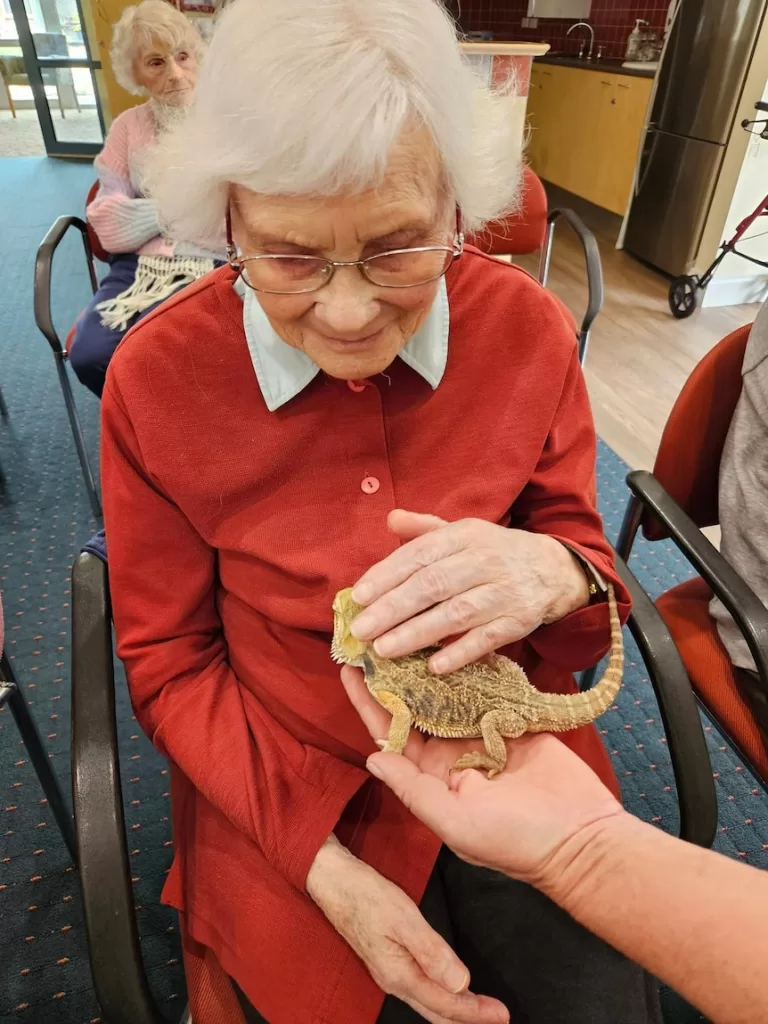Aged care residents in the small country community of Millicent are expecting some visitors.
As wildlife handler Louise McKay sets up in the common room at Boneham Aged Care, eyes trace the crates and cages with intrigue — and a little apprehension.
Many of the residents were pet owners themselves before moving to the retirement and aged care facility in south-eastern South Australia, but few could count rare birds, snakes or saltwater crocodiles as their companions.
“I get great joy out of taking my animals to events, but aged care visits are special,” Ms McKay says.
“Out there in aged care, they do get forgotten a bit and they miss out on a lot, but they’ve got so much to give.
“They don’t always have an opportunity to give and I feel like I give them that opportunity by coming with my animals.
“They now have a memory of when they were a child, and they’re able to give me that memory — it’s fabulous, it puts a smile on their faces.”
Decades of animal education
Louise and Al McKay have spent decades in wildlife education and conservation in Queensland, including stints at Dreamworld and on the television show Totally Wild.
Since moving to Penola near Mount Gambier in south-eastern South Australia last year, the couple have introduced locals to their menagerie of Australian native animals through their Australian Bush Buddies mobile wildlife education business.
Among their “family” of animals is a Lucinda, a 14-year-old black-headed python; Boo Boo the hand-reared masked owl; Calypto, a Netflix-famous glossy black cockatoo who once starred in a David Attenborough documentary; and a backyard full of lizards, birds and gliders.
“All of the animals to us are equal, exciting and animals that most people don’t come into contact with,” Mr McKay says.
“We have Ryobi — and yes, he was named after a whippersnipper — he’s a one-year-old ringtail possum who, as a joey was accidentally hit by the tool in long grass.”
Ms McKay says there was talk of euthanasing the possum, as he also had cataracts and may become blind in the future.
“But I was able to talk to the department and they decided they’d be happy to pass him on to me,” she says.
“We also have Goldie the squirrel glider who Al raised; she thinks Al is her mum and like all baby squirrel gliders, who like to pee on their mums, Goldie likes to pee on Al.”
Outreach rewarding
Aside from country shows, council events and school visits, the McKays say it’s the opportunity to take their animals to “the people in society who often miss out” that brings the greatest rewards.
“Disability is a space that we love to engage with,” Mr McKay says.
“What always strikes me is vision-impaired people; being able to touch and smell an animal really makes for a memorable experience.”
Ms McKays says kindergartens are also wonderful.
“Not every child has pets at home, and it’s lovely to see their big eyes fill with wonder and their confidence grow when they hold a snake,” she says.
But sharing her menagerie with older people is what really lights Ms McKay up.
“In the beginning when I first get there, they’re often a little bit wary of it all,” she says.
“[They say], ‘I won’t be touching that — what have you got in there, has that thing got sharp teeth?’
“I let them know, yes, to all those questions. But I remind them that they’re friendly and I really encourage them to have that sensory touch … and you can just see their whole face and demeanour change [when they do].”
For some resident, the McKays’ visits have had even greater benefits.
“I’ve had staff members tell me that some residents hadn’t spoken in years … and after I’ve been and they’ve engaged with the animals, they started to talk and even share memories and stories,” Ms McKay says.
Conservation education
The couple is also proud to have made an impact on grassroots conservation.
“Quite a few of the [school] classes have gone on to plant sheoak trees after they met our glossy black cockatoo,” Ms McKay says.
“It’s exciting to think we can help them with their conservation and environmental projects,” Mr McKay adds.
Get our local newsletter, delivered free each Friday
